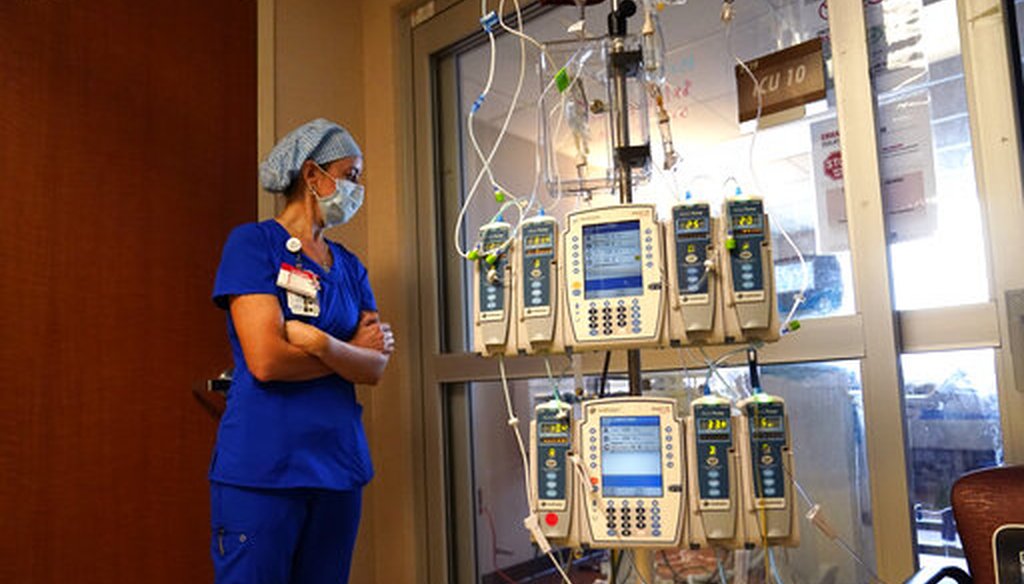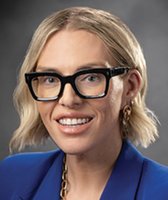Get PolitiFact in your inbox.

Nursing coordinator Beth Springer looks into a patient's room in a COVID-19 ward at the Willis-Knighton Medical Center in Shreveport, La., on Aug. 17, 2021. (AP)
If Your Time is short
-
Infectious disease experts say that estimating the percentage of college students who have previously been infected by the coronavirus basically boils down to a guess, since there is little comprehensive testing of who has antibodies to the virus.
-
Exposure to the coronavirus does offer some immunity, but experts caution that the vaccine provides immunity at less risk to the patient, and potentially with stronger protection.
In August, as West Virginia University administrators were facing pressure from faculty and students to mandate the coronavirus vaccine, President Gordon Gee was asked by WVU’s student newspaper about his approach to protecting the campus from the coronavirus.
During the Aug. 24 interview, reporters from the Daily Athenaeum asked Gee why the university was requiring masks in classrooms and labs but not in other indoor areas for the fall 2021 semester.
"Very honestly, your age group, our dean of public health will tell you that, probably 60% or 70% of you have the virus," Gee said. "You've had it. You just don't know you've had it. So you're actually immune. And so there is a level of immunity that none of us really understand. But you do have that."
When we asked infectious-disease experts about Gee’s numerical estimates, they said the reality was murkier than Gee made it out to be.
We began by reaching out to the university official Gee specifically cited for support in his interview: Jeffrey Coben, WVU’s dean of public health.
In an interview with PolitiFact West Virginia, Coben didn’t go as far as Gee did with the Daily Athenaeum.
"It is possible that a percentage of our students may have had COVID-19 in the past, either symptomatic or asymptomatic, and could have some level of immunity," Coben said. "Regardless, it's vitally important that all eligible individuals who are not vaccinated, even if they have been infected, should receive the COVID-19 vaccine to add an extra layer of protection."
Meanwhile, experts beyond the WVU campus expressed some doubt about Gee’s 60% to 70% figure.
Monica Gandhi, a professor of medicine at the University of California-San Francisco, told PolitiFact West Virginia that there’s no way to be certain what percentage of college students have been infected by the coronavirus, since there has not been comprehensive testing.
Gandhi said that estimates of "seroprevalence" — that is, the extent to which infections have occurred throughout the population — have been made by the Centers for Disease Control and Prevention.
For instance, a study of blood donation specimens found that, among donors of all ages, slightly over 20% had infection-induced antibodies by May 2021. Samples from persons between 16 and 29 years of age were higher, at 27%. (These figures do not include vaccine-generated antibodies.) That’s well below the percentages cited by Gee.
Other studies have also found levels below what Gee cited.
For instance, a study led by a Yale University researcher and published Sept. 14 estimated that as of July 15, nearly 115 million people in the U.S. had been infected. That would be about 35% of the total U.S. population of nearly 333 million. The estimate was based in part on infection-fatality data from the CDC.
Babak Javid, a professor of medicine at the University of California-San Francisco, said that, based on the percentage of known cases among younger adults and scaling up for uncounted, asymptomatic cases, "it's not unreasonable to assume that 40% to 50% of that age group has had COVID-19."
Gee’s claim, while speculative, "isn't widely outlandish," Javid said. "It's very much not likely to be just 10% who have been infected in that age group."
What’s the value of natural immunity?
What about Gee’s assertion that past infections confer "a level of immunity"? Experts say there is some immunity from having had COVID-19 in the past, but just how much is uncertain.
For instance, Arthur Reingold, an epidemiologist at UC-Berkeley, and Shane Crotty, a virologist at the La Jolla Institute for Immunology in San Diego, recently gave expert witness testimony saying the extent of immunity from reinfection, especially against newer variants of COVID-19, is unknown.
However, Jeffrey Klausner, clinical professor of population and public health sciences at the University of Southern California, co-authored a recent analysis that suggested infection generally protects for 10 months or more.
"The discussion of natural immunity versus vaccination-induced immunity is a long and complicated one," Gandhi told PolitiFact West Virginia. "There is no doubt that natural immunity does provide protection, and a recent study from Israel shows that natural immunity may actually provide more protection from reinfection than vaccination. However, a recent study from Kentucky showed the opposite effect."
Javid added that "prior infection plus vaccination is superior to prior infection alone in preventing re-infection, But prior infection alone, at least in the last six months, appears to be pretty good on its own, too."
This doesn’t mean that vaccination isn’t recommended, however. The risk of a complication from getting sick with COVID-19, while low, especially among students, is higher than the risk of complications from the vaccine.
Tom Kertscher contributed to this article.
Our Sources
The Daily Athenaeum, Gee talks vaccines, masks and international students, Aug. 24, 2021
CDC, Answering Patients' Questions
CDC, COVID-19 Trends Among Persons Aged 0-24 Years
CDPH, COVID-19 Cases by Age Group
Jefferson M. Jones, et al., "Estimated US Infection- and Vaccine-Induced SARS-CoV-2 Seroprevalence Based on Blood Donations, July 2020-May 2021," Sept. 2, 2021
Seyed M. Moghadas, et al.,"Population Immunity Against COVID-19 in the United States," Sept 14, 2021
PolitiFact, "COVID immunity through infection or vaccination: Are they equal?" Oct. 11, 2021
Email interview with Jeffrey Coben, WVU dean of public health, Sep. 1, 2021
Email interview with Babak Javid, a professor of medicine at the University of California-San Francisco, Sep. 1, 2021
Email interview with Monica Gandhi, a professor of medicine at the University of California-San Francisco , Sep. 1 2021
Email interview with April Stolzenbach, the Director of News for WVU University Relations, Sep. 1, 2021

























